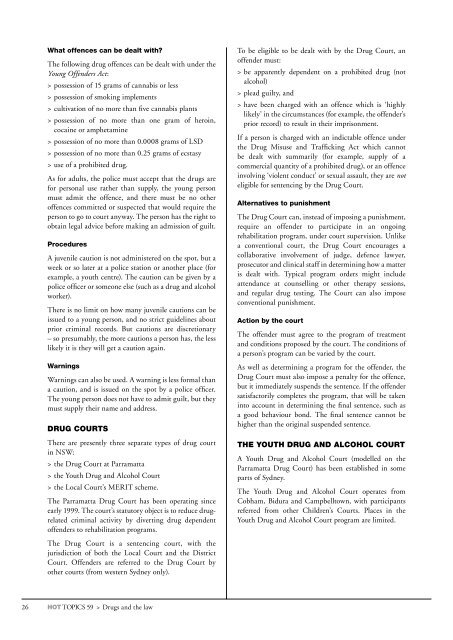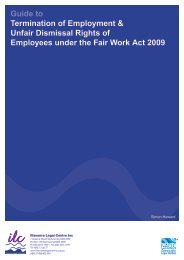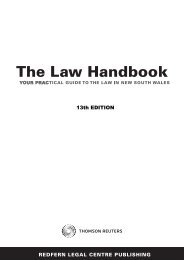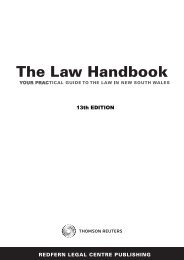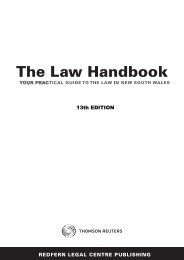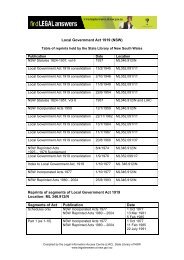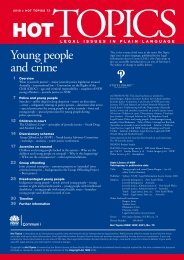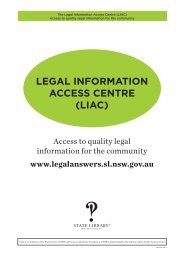Drugs and the law - Hot Topics 59 - Find Legal Answers
Drugs and the law - Hot Topics 59 - Find Legal Answers
Drugs and the law - Hot Topics 59 - Find Legal Answers
Create successful ePaper yourself
Turn your PDF publications into a flip-book with our unique Google optimized e-Paper software.
What offences can be dealt with?The following drug offences can be dealt with under <strong>the</strong>Young Offenders Act:> possession of 15 grams of cannabis or less> possession of smoking implements> cultivation of no more than five cannabis plants> possession of no more than one gram of heroin,cocaine or amphetamine> possession of no more than 0.0008 grams of LSD> possession of no more than 0.25 grams of ecstasy> use of a prohibited drug.As for adults, <strong>the</strong> police must accept that <strong>the</strong> drugs arefor personal use ra<strong>the</strong>r than supply, <strong>the</strong> young personmust admit <strong>the</strong> offence, <strong>and</strong> <strong>the</strong>re must be no o<strong>the</strong>roffences committed or suspected that would require <strong>the</strong>person to go to court anyway. The person has <strong>the</strong> right toobtain legal advice before making an admission of guilt.proceduresA juvenile caution is not administered on <strong>the</strong> spot, but aweek or so later at a police station or ano<strong>the</strong>r place (forexample, a youth centre). The caution can be given by apolice officer or someone else (such as a drug <strong>and</strong> alcoholworker).There is no limit on how many juvenile cautions can beissued to a young person, <strong>and</strong> no strict guidelines aboutprior criminal records. But cautions are discretionary– so presumably, <strong>the</strong> more cautions a person has, <strong>the</strong> lesslikely it is <strong>the</strong>y will get a caution again.WarningsWarnings can also be used. A warning is less formal thana caution, <strong>and</strong> is issued on <strong>the</strong> spot by a police officer.The young person does not have to admit guilt, but <strong>the</strong>ymust supply <strong>the</strong>ir name <strong>and</strong> address.drug cOurTsThere are presently three separate types of drug courtin NSW:> <strong>the</strong> Drug Court at Parramatta> <strong>the</strong> Youth Drug <strong>and</strong> Alcohol Court> <strong>the</strong> Local Court’s MERIT scheme.The Parramatta Drug Court has been operating sinceearly 1999. The court’s statutory object is to reduce drugrelatedcriminal activity by diverting drug dependentoffenders to rehabilitation programs.The Drug Court is a sentencing court, with <strong>the</strong>jurisdiction of both <strong>the</strong> Local Court <strong>and</strong> <strong>the</strong> DistrictCourt. Offenders are referred to <strong>the</strong> Drug Court byo<strong>the</strong>r courts (from western Sydney only).To be eligible to be dealt with by <strong>the</strong> Drug Court, anoffender must:> be apparently dependent on a prohibited drug (notalcohol)> plead guilty, <strong>and</strong>> have been charged with an offence which is ‘highlylikely’ in <strong>the</strong> circumstances (for example, <strong>the</strong> offender’sprior record) to result in <strong>the</strong>ir imprisonment.If a person is charged with an indictable offence under<strong>the</strong> Drug Misuse <strong>and</strong> Trafficking Act which cannotbe dealt with summarily (for example, supply of acommercial quantity of a prohibited drug), or an offenceinvolving ‘violent conduct’ or sexual assault, <strong>the</strong>y are noteligible for sentencing by <strong>the</strong> Drug Court.alternatives to punishmentThe Drug Court can, instead of imposing a punishment,require an offender to participate in an ongoingrehabilitation program, under court supervision. Unlikea conventional court, <strong>the</strong> Drug Court encourages acollaborative involvement of judge, defence <strong>law</strong>yer,prosecutor <strong>and</strong> clinical staff in determining how a matteris dealt with. Typical program orders might includeattendance at counselling or o<strong>the</strong>r <strong>the</strong>rapy sessions,<strong>and</strong> regular drug testing. The Court can also imposeconventional punishment.action by <strong>the</strong> courtThe offender must agree to <strong>the</strong> program of treatment<strong>and</strong> conditions proposed by <strong>the</strong> court. The conditions ofa person’s program can be varied by <strong>the</strong> court.As well as determining a program for <strong>the</strong> offender, <strong>the</strong>Drug Court must also impose a penalty for <strong>the</strong> offence,but it immediately suspends <strong>the</strong> sentence. If <strong>the</strong> offendersatisfactorily completes <strong>the</strong> program, that will be takeninto account in determining <strong>the</strong> final sentence, such asa good behaviour bond. The final sentence cannot behigher than <strong>the</strong> original suspended sentence.THe yOuTH drug <strong>and</strong> alcOHOl cOurTA Youth Drug <strong>and</strong> Alcohol Court (modelled on <strong>the</strong>Parramatta Drug Court) has been established in someparts of Sydney.The Youth Drug <strong>and</strong> Alcohol Court operates fromCobham, Bidura <strong>and</strong> Campbelltown, with participantsreferred from o<strong>the</strong>r Children’s Courts. Places in <strong>the</strong>Youth Drug <strong>and</strong> Alcohol Court program are limited.26HOT TOPICS <strong>59</strong> > <strong>Drugs</strong> <strong>and</strong> <strong>the</strong> <strong>law</strong>


